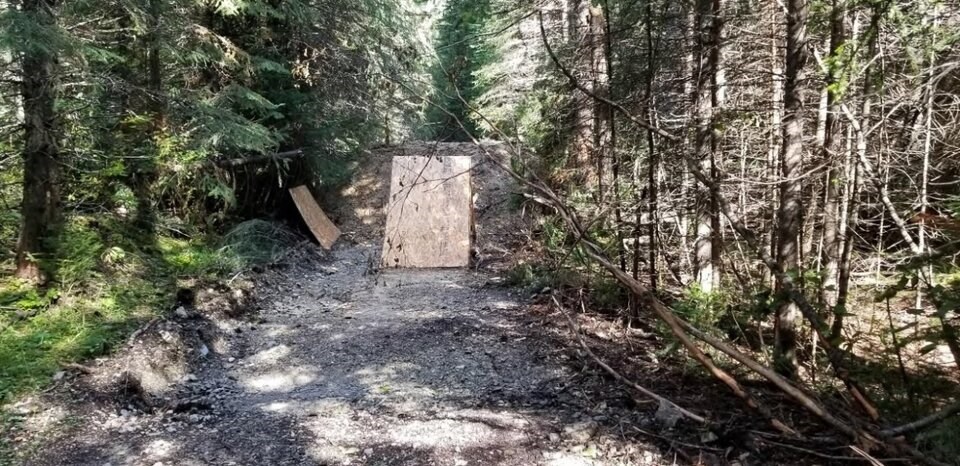A B.C. court has fined a man $21,600 for building an illegal bike jump in a national park.
The incident, which happened in 2019, occurred while John Matthew Summers worked as an employee for CP Rail. To install the wooden jump, Summers used a front-end loader to blaze a section of an old rail grade near Kicking Horse Pass, according to James Eastham, a spokesperson from Parks Canada.
Digging out the path snapped several trees. But the most serious damage was to two archaeological sites, including a work camp used in the construction of the Spiral Tunnels and a rail grade part of the historic “Big Hill” rail line.
“The impact to the damaged archaeological sites are significant, particularly because of the use of heavy machinery,” Eastham later wrote in an email.
He said the heavy machinery broke concrete foundations, as well as wood, glass and metal artifacts near the surface.
The jump was built near the Kicking Horse Pass National Historic Site, the highest point of the Canadian Pacific Railway and a collection of sites associated with the construction of the first trans-continental rail line in Canada.
Court records show Summers was slapped with two counts contravening the Canada National Parks Act, including destroying a natural object and a historic structure, and one count of operating a vehicle off the highway. Summers was eventually found guilty in a Golden, B.C., court room earlier this year.
Just under half of that money will go toward rehabilitating the site, with the rest contributing to the environmental damages fund, a federal pot of money that funnels fines from environmental damages into restoring the environment and conserving wildlife.
Unsanctioned trails a growing problem
The building of unsanctioned trails on park and Crown land has been a problem for years, but one that appears to be growing, said Louise Pedersen, executive director of the Outdoor Recreation Council of BC.
“When it comes to mountain biking, it is kind of part of the culture. They’re not going through the official channels to seek approval,” Pedersen said.
“It’s not OK to just start digging. But it is happening. It is a fact. It’s quite prolific.”
Creating your own trail can pose a problem because it skips the environmental and cultural assessments that help avoid collateral damage, said Pedersen. But as populations grow across Metro Vancouver, Vancouver Island and the Interior, sanctioned trails — whether for hiking or mountain biking — have failed to expand at the same pace.
And that, Pedersen says, is putting more pressure on the province's historic and cultural sites, and sensitive environments.
“It has always been an issue. But it is likely a growing issue,” Pedersen said. “When you harm ecological or cultural values, there needs to be a deterrent.”
As part of Summers's sentencing, the judge cited a number of recent offences related to national parks, including a 2018 ruling in which a lodge in Banff National Park was fined $27,000 for destroying endangered swallow nests, fines for feeding grizzly bears, and the theft of priceless fossils within 10 kilometres of the illegal bike jump.
In 2020, a park warden in Lake Louise received a tip that someone had removed a number of samples from the Burgess Shale fossil site in Yoho and Kootenay national parks. The UNESCO world heritage site contains fossil evidence of the earliest complex sea animals on the planet, in some case, dating back over 505 million years.
On Nov. 20, 2020, park wardens in Quebec executed a search warrant at a home in Montreal, where they found 45 fossils stolen from the B.C. park. A court later imposed a $20,000 fine and five months of house arrest.


